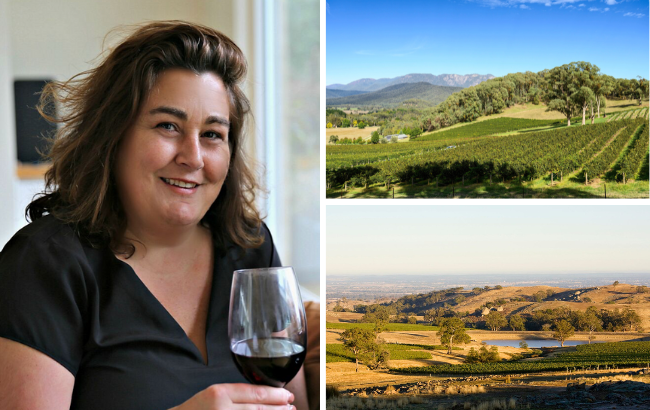‘Carbon footprint significantly higher with organics’
By Patrick SchmittClimate change activist and leading Port producer, Adrian Bridge, has questioned the environmental benefits of organic viticulture, pointing out that the agricultural method produces “significantly” more C02.
Adrian Bridge is CEO of The Fladgate Partnership, and organiser of the international conference Climate Change Leadership – Solutions for the Wine Industry, which was held in Porto earlier this year. In 2018, he was instrumental in the launch of the Climate Change Leadership Summit in the same city, which saw the introduction of the Porto Protocol – a written commitment that the wine industry will work harder and more collaboratively towards tackling climate change
Speaking at a conference on sustainability in the wine industry, hosted by Mentzendorff wine shippers in London earlier this year, Bridge made it clear that he wouldn’t be embracing organic approaches to vineyard management in a bid to make his business more environmentally-friendly.
Having analysed several measures being taken by the company he manages, The Fladgate Partnership, which owns Taylor’s Port, he said, “Your carbon footprint is significantly higher with organics, and you don’t need to go organic to make great wine.”
When asked by db after the conference to explain his remark, Bridge pointed out that organic viticulture was a less efficient form of farming, while also noting that it required a greater use of Copper Sulphate in the treatment against mildew in the vines.
By way of example, Bridge, who launched the international wine conference Climate Change Leadership two years ago, mentioned his own experience measuring the carbon footprint of his key Port brand, Taylor’s LBV.
“Currently, our carbon footprint for Taylors LBV is 2.8 kilos of carbon per litre, which is down 7% over the past two years, but, if I compare that figure to 2014, when it was 2.4 kilos, then you would think that we have got worse – we are producing more carbon dioxide,” he said.
Continuing, he explained, “But, no, we haven’t got worse, it was because in 2014 we had much higher yields, so my point is this: with organics, when you are likely to get 25% lower yields from your vineyards, you end up producing more Carbon Dioxide per litre – and you’ll be using more Copper Sulphate too, which builds up in the soil.”
In conclusion, he said, “So it’s far better to be a sustainable farmer, and eliminate herbicides, and cut down on pesticides, but you don’t have to remove them altogether.”
Such remarks echo those previously reported by db, which came from another prominent climate change activist in the wine industry, Miguel Torres.
During a discussion with db in 2017, he said that he wouldn’t be converting all his estate to organics because of the increased amount of energy required to manage vines in this manner, as well as the extensive use of copper.
“The problem with organic [viticulture] is that we have to use copper against mildew, and it is a problem: copper is toxic,” he said.
Continuing, he also said that because copper is less effective than synthetic chemicals against fungal diseases such as mildew, it needs to be applied more often, which in turn produces more carbon emissions from the greater number of miles travelled by the vehicles spraying the heavy metal.
“With organics there are more emissions because we have to pass through the vineyard more often,” he said.
Partner Content
As a result, he said that he would like to see organic certification in Europe come with a requirement that, because of the greater amount of fuel used, and therefore carbon dioxide produced, there should be a compensatory increase in the quantity of energy sourced from renewables, particularly using solar panels.
At the time, the comments by Torres prompted two opposing responses, one from prominent viticulturist Dr Richard Smart, and the other from, Soil Association UK policy director, and organic farmer, Peter Melchett – and both are reproduced below.
Meanwhile, Bridge also said at the recent conference in London that he is now planting vineyards in such a way as to eliminate the need to use herbicides, or irrigate, while aiding the ripening process.
He also stressed a need to consider water use in winemaking. “The wine industry is a big user of water, and winemakers tend to use a lot of it, but we have reduced the amount of water we use from 4.4 litres for 1l of wine to 1.7l of water for each litre of wine, and we have done this by making sure that nothing is wasted, for example, we now have pistol grips on the end of every hose, so you will never have a tap that is left unattended.”
For more examples of how producers in the drinks industry have reduced their impact on the environment, please click here to read a full report on the winners in last year’s Drinks Business Green Awards.
The view from Dr Richard Smart
“I totally agree with Miguel. It is ridiculous to rely only on a toxic fungicide like copper, which requires many applications and the use of more fuel in the tractor. The “regulators” of the organic movement do not know what is really important, like climate change.
“Another problem with organic viticulture is the banning of “synthetic” fertilisers. It is easy to pick out organic vineyards in a district, they are so starved of nutrients. And I have seen often that nutrient stress predisposes them to trunk diseases.
Good for you Miguel, it is time the witch doctors were kicked from controlling viticulture!”
The view from Peter Melchett
“Miguel Torres is right that copper is used a fungicide in organic farming, but otherwise his claims are plain wrong. Copper is a natural mineral, found in soil, essential for all healthy crop growth, and often added as a soil conditioner in non-organic farming. However, it can only be used by organic farmers, usually on some potatoes, vines or apple trees, as a last resort, under strict conditions, with special permission, and organic farmers can only apply up to 6kg per hectare per year. Many vineyards will never need spraying. Miguel Torres’ suggestion that organic farming uses more energy because of repeated spraying is therefore not true, and research on organic farming generally shows lower energy use than non-organic.
“Dr Smart’s comment on the article added another inaccurate point, when he says organic farmers don’t care about climate change, but then argues that organic standards should not ban manufactured Nitrogen fertilisers. He seems unaware that these fertilisers cause around 40% of greenhouse gas emissions from farming, and because they are banned in organic is a key reason that organic farming has lower greenhouse gas emissions.
“Manufactured fertilisers and almost all chemical sprays (fungicides, insecticides and all weed-killers) are banned by EU organic standards, and organic wines are produced in ways that use less manufactured chemicals and additives. Organic farming is better for farmland wildlife, for preventing diffuse pollution and for climate change. Organic wines are produced in ways that respect the environment, and the rapidly growing sales of organic food and drink worldwide show that people increasingly agree.”





This is a bit rich coming from The Fladgate Partnership – who still claim that their Fonseca Terra Prima is the world’s first organic Port. Bridge’s arguments all appeared in an article published years ago by The World of Fine Wine: http://www.worldoffinewine.com/news/the-great-organic-grape-scam-4704802
Sounds Like the Usual noise from farmers that don’t want to get certified organic but see their neighbors farms out selling them at higher margins after they went organic. Organic means less input or no input. If you need to increase inputs to get what you want as an end product them you are trying to go organic in a region that is not feasible to grow organic. Move your farm or keep to Agro farming. As you cant move you are stuck. So no griping.
I’m on the fence on this one, I’m a producer considering organics. Anecdotally for my region (McLaren Vale – quite dry, so low copper / other fungicides) I know it is more expensive simply because you tend to do twice the amount of tractor passes per year to be organic.
As for nitrogen input, a high rate is 60kg/hectare, which is meant to produce about 300kg CO2 / hectare (thanks google) – one hectare produces about 10t or grapes, or 7000L of wine, so contributes a bit over 0.042kg CO2 per L of wine. so I can’t see this being a big factor.
Why on the fence then? The perception of organics is important from a marketing point of view. Perhaps I’ll look into certified carbon neutral – does this have any credence?
Either way, I’m happy for anyone to try to be more environmentally responsible, or at least try.
About time we put organic farming under the microscope.
Organic farming needs 15% more land to produce the same food output as a scientific farm. That in itself is one hell of an indictment because in a world of declining arable land we’d need to find more of it to meet rising demand using organics (forest clearing anyone?). To me, it’s a classic ‘rich man’ approach driven by a bunch of inner suburban dwellers disconnected from agriculture who know not the damage done by build up of organic ‘treatments’ like copper sulphate on the land nor the requirement to create additional farm land to feed the rising global middle class.
To me, purely organic farming is like homeopathy. The strategy to keep a vine healthy to minimise disease risk is sound and employed by any half decent vigneron.. but to then say that they cannot treat a disease when it arises with modern science is no different to someone telling you to treat cancer by diet alone. Enough. Sustainable agriculture and reduction in environment damage needs to use more science not less.
Bring back respect for science – ignoring sound scientific recommendations in viticulture and farming is like, ignoring the scientific community on climate change…
Lots of definitive statements can be made from which ever side of the fence you sit, the copper usage is often the go to for the non organic practitioners, fair enough there is an issue if over used but there are levels established by i suspect some learned persons who are concerned with soil health, 3kg/ha per year in NZ Viticulture, its a limit not a target and not many would ever get close to that. So is that over use? We monitor copper in soil tests yearly to make sure its not. Remember also that non organic growers use copper and are subjected to the same rules in usage. ,We also conduct multi residue tests (not common in other farming systems) and if you think that copper is the only product that hangs around in the soil then you are kidding yourself. we often find synthetics, insecticides etc years after from previous land (non organic) use. More tractor passes? Why? Its not the case here. We don’t ignore scientific recommendations we just choose our science wisely. There are loads of positives outcomes in growing organically including the sensational wines!